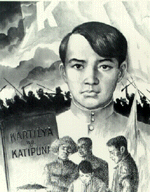


It was his sad experiences with his
Spanish classmates and sensitivity to the plight of the Filipinos as caused by the injustices of the Spaniards that
led Emilio Jacinto to become a Katipunero.
Born in Trozo, Manila on December 15, 1875,
Jacinto's early education was supported by his widowed mother who worked as a midwife. Later on, his uncle enrolled him at
the San Juan Letran College after which he took Law at the University of Santo Tomas.
It was the need to join the Katipunan that
interrupted the young man's studies as he was only 19 years old when he joined it. Even at that young age, he became one of the
ablest leaders of the movement. To Bonifacio, he was an adviser, a secretary and a fiscal. A gifted writer, Jacinto was also
the editor of "Ang Kalayaan," the movement's newspaper. He also wrote the "Kartilla," its primer containing the
movement's rules and regulations. Also a poet, he wrote "A La Patria," which was inspired by
Dr. Jose Rizal's "Mi Ultimo Adios," under the pen name of Dimas Law. He also supervised the
manufacture of gunpowder. Thus, the title of "Brains of the Katipunan" was bestowed on him.
Alas, like most heroes, his life has to be taken
while serving his fellow countrymen. Jacinto, mortally wounded in one of the battles in Majayjay, Laguna died on April 16, 1899
at the age of 24.
